‘The Good Fight’ Series Finale: Co-Creators Robert and Michelle King on Ending Diane Lockhart’s Journey in a Hail of Bullets
- Oops!Something went wrong.Please try again later.
- Oops!Something went wrong.Please try again later.
- Oops!Something went wrong.Please try again later.
- Oops!Something went wrong.Please try again later.
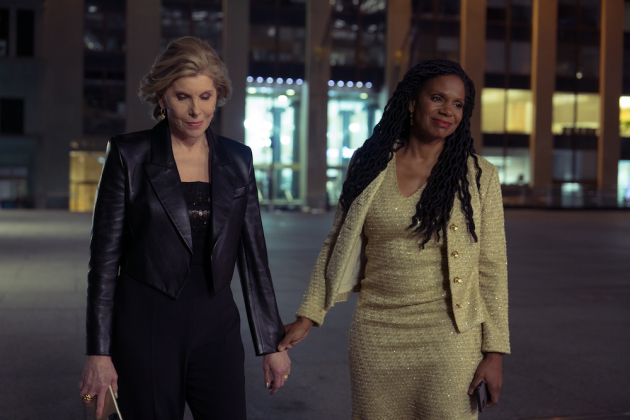
SPOILER ALERT: This interview contains spoilers from “The End of Everything,” the series finale of “The Good Fight,” now streaming on Paramount+.
After six seasons, the clock has run out on “The Good Fight” — but not before leaving audiences with a gut-punch reminder that the fight is never over.
More from Variety
All season, the Paramount+ series has not-so-subtly used an escalating alt-right protest and fake grenades to tease a mysterious countdown to something happening on 11/10, which also marked the airdate for this week’s series finale.
But that doomsday clock wasn’t ticking down to the attempted assassination of the entire staff of Reddick & Associates, which showered the firm’s offices and the final hour in bullets. Instead, the clock timed out in the series’ final seconds with the news that Donald Trump had selected 11/10 as the day to announce his 2024 presidential run.
As such, “The Good Fight” ended where it began, something co-creators Robert and Michelle King had also done with the show’s predecessor, the Julianna Margulies-led CBS drama “The Good Wife.” In that series finale, Margulies’ Alicia Florrick found herself on a contemplative walk down the same hallway from the pilot episode, where she had slapped her unfaithful state’s attorney husband. Only this time, it was a betrayed Diane Lockhart (Christine Baranski) who left a mark on Alicia’s cheek, having watched the latter expose her husband Kurt’s (Gary Cole) affair in court.
While no one was slapped at the end of “The Good Fight,” the not-so-speculative closing sequence hit hard enough to sting, as Diane and Liz (Audra MacDonald) watched footage of the former president donning a 2024 hat in front of an adoring audience. It calls back to the series’ own premiere, which arrived less than a month after Trump’s 2017 inauguration, and famously opened with a gob-smacked Diane watching his swearing in.
“We are into bookends — we just are,” says Robert King, who also directed the finale.
Over the course of the series, Diane and company wrestled with the insurmountable notion of practicing law in an increasingly lawless time (“It’s like shouting into a room full of shouting people,” she laments in the finale).
But in the end, just as Diane ponders buying a French villa and escaping the hate, Liz persuades her to go to Washington, D.C to lead Reddick & Associates’ newly acquired all-female law firm, a dream they had voiced earlier in the series that will focus on women’s issues in wake of Roe v. Wade being overturned. Learning of the opportunity, a newlywed Marissa (Sarah Steele) hired herself to run the D.C. firm’s litigation department, to which Diane put up little resistance.
Liz, in turn, will stay put in Chicago to jointly run, with Ri’chard (Andre Braugher), an expanded firm that now has offices in Dubai and London, thanks to Ri’chard taking over STR Laurie.
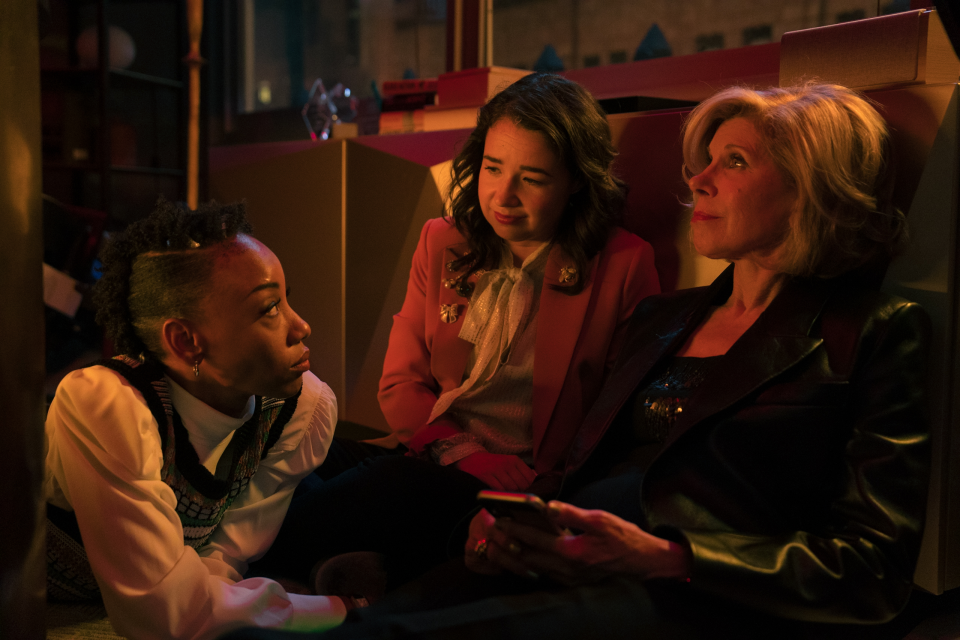
Jay (Nyambi Nyambi) decided to quit the firm to fully focus on his work with the elaborate-yet-effective activist group The Collective, even though Carmen (Charmaine Bingwa) declined the offer to join him in order to stay by Liz’s side.
The busy and surprisingly action-packed finale brought to an end 13 years of storytelling that began with CBS’ “The Good Wife” in 2009. One note: Though the events of the finale revealed that the Kings had predicted months ago that Trump would (seemingly) announce he’s again running for president after the midterm elections, this interview took place before the actual elections on Nov. 8. Therefore, in one answer, Robert King mistakenly presumed — as so many polls had indicated — that there would be a Republican wave for which Trump would take credit. Presumably, Diane would be pleased that the polls were wrong.
The Kings spoke to Variety about why now is the right time to close the book, why they indulge in a bit of optimism, what past client almost made an appearance and whether they might revisit these characters in the future.
There is a lot to cover in the series finale, but few things will be as satisfying for long-time viewers than seeing the explosive title sequence come to life as the white supremacists were shooting up the Reddick & Associates offices. Was it ever planned to narratively pay off the cathartic credits?
Michelle King: I would love to say that, yes, we knew that from the moment we started the show, but no. That came together in the final episode.
Robert King: When we were building the final episode in the writers’ room, we were worried about a tonal shift where there are suddenly guns going off and everything would be a little too “Die Hard.” So I think the real decision was to shoot up the things that we have seen in the main titles, and that will explain the explosions we have been seeing the whole series. It wrapped things up, and didn’t make it feel like you were suddenly watching an action movie.
This is the culmination of 13 years of storytelling and world building across two shows. Why was now the time to bring it to a close?
Michelle: It felt like the right time. We didn’t want to start repeating ourselves, and I’m feeling good about this season. We thought it would be nice to go out on a high.
Robert: It also felt like world events were starting to shorten our ability to tell stories. I mean, the idea this season was that Diane is exhausted by events and starts to almost become catatonic. It felt like it was going to be difficult to show an original version of that next year. And also the tension with Kurt [Gary Cole], her husband — there just weren’t that many more steps you could take in that direction. So to end on this kind of year that is about civil war and the violence around us felt like a good way to end that makes the audience think maybe everybody is going to die [by the final episode].
As you mentioned, Diane is exhausted with the world. She has spent the season questioning whether the law even matters in our world today, and seeking treatment from hallucinogens. But she ultimately sticks with it by accepting Liz’s proposal to run the all-female law firm in D.C. How did you come to the conclusion she would keep fighting the good fight, pun very much intended?
Michelle: Well, if she wasn’t questioning it, she would not be paying attention. We’ve got a smart character in Diane who is aware of the world around her and she’s aware that what she’s been fighting for for decades suddenly seems no longer to be true. But we indulge in a bit of optimism to say she is not giving up, in spite of everything.
Robert: Michelle and I had to face that question when writing that scene: What is the argument you could make to stay? And that brought us to the idea that it is not about the big movements of history, but really about the people you helped along the way. So we went back through old episodes to find out, OK, who did we help? You forget those people you helped on the way, which is what led to [Liz listing Diane’s past clients] and a beautiful David Buckley score plays off the theme of the main title to accompany it. It felt like a smart way to move Diane, like “It’s a Wonderful Life.” Who did he help who would not have been helped if he never existed? That was our intent.
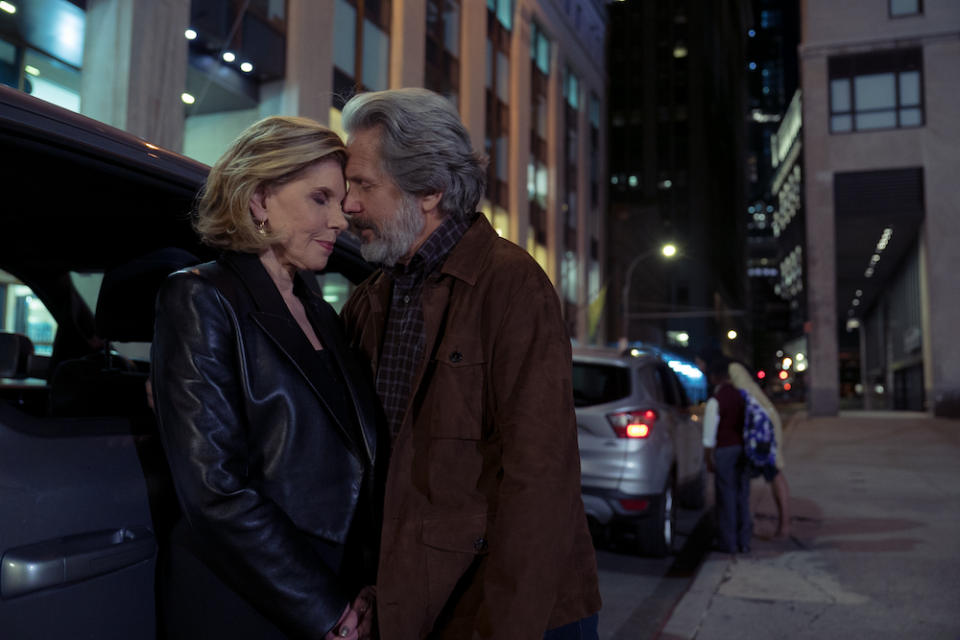
Similarly, what about this moment allowed you to say Diane and Kurt can make it, after breaking them up in the penultimate episode?
Robert: That one was a bit more difficult. I do think it was him quitting the NRA. But he is a rescuer. He is a guy who thinks, “My love is in trouble, and I’m going to climb these stairs to go get her.” And the last thing was Carmen’s words to Diane, reminding her that at this moment when she thought she was going to die in the first episode of this season, she had one word she spoke out loud and that was “Kurt.” When your body or mind tells you something, listen. That is where she is left at the end.
Michelle: And Kurt McVeigh, from the very beginning of us meeting him in “The Good Wife,” has always been a character with tremendous integrity. He never stopped being that and I don’t think that was lost on Diane, especially when she spends her day with Felix Staples, who is the person with the least integrity she will ever encounter.
Is that why, from your vast stable of past clients and amazing guest stars, it is Felix Staples (John Cameron Mitchell) who gets this plum series finale part?
Michelle: Well, that’s just because John is funny and fantastic.
Robert: We knew we could count on him to be a showman that could come in and make a splash, and it felt like the last episode should be about the past, present and future. The past, in the episode, is about the civil rights heroes and how you brand them [with the video game]. The present is about the rioting outside the building, and the future is about who is going to run in 2024 on the Republican side. We needed someone, who was initially inspired by Milo Yiannopoulos, who is a Republican activist, but seems to want to take down Ron DeSantis to get Trump elected.
Michelle: We also knew that this episode was going to take place primarily in a locked down office, where everyone is stuck there. There was a sense of who is going to be the worst person for them to be stuck with — and that had to be Felix.
Robert: We even considered having two people and the other person was going to be Dylan Baker, who played Colin Sweeney, the serial killer from “The Good Wife” and “The Good Fight.” We could have had both of these guys, but we realized it would be juggling too many balls.
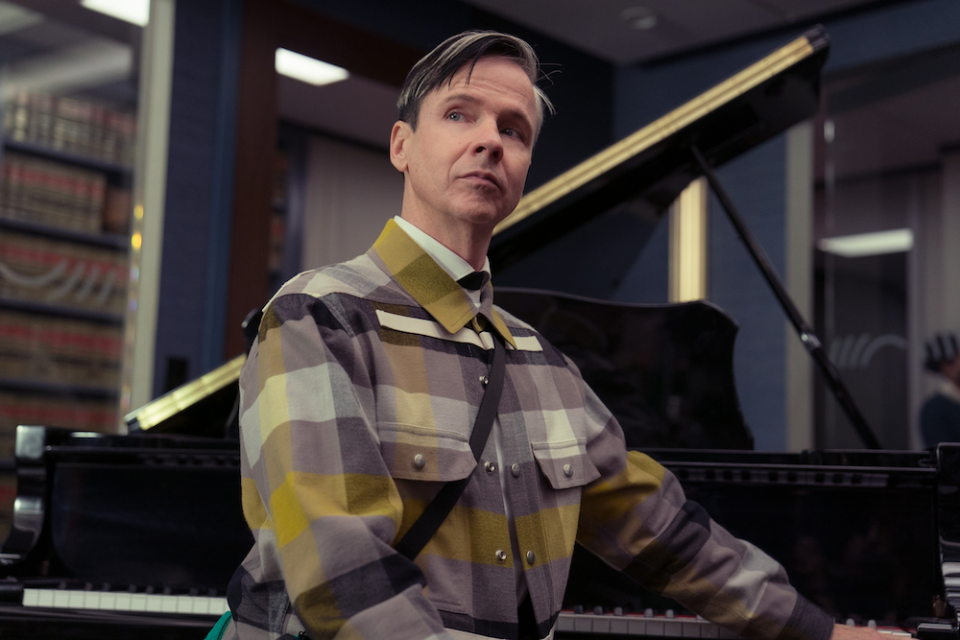
And with John, you got a musical moment!
Michelle: We got that, and so much more.
This series premiered in the immediate wake of Donald Trump’s inauguration, and you both have been candid about how it changed the course of the show. Which makes the final shot of the series being footage of the former president quite a statement. What was behind the decision to come full circle?
Robert: We are into bookends, we just are. A lot of streaming shows today are eight-hour movies and blah, blah, blah. They are telling one story. But because [our show] is telling a lot of short stories that are connected like pearls on a necklace where they all add up to something, you need a bookend that gives it some feeling of embracing a concept. It started in one place and it hopefully comes full circle to that place. We thought the midterms would happen and Trump would announce after because he wouldn’t want to be blamed for the midterms. He wants to come in afterwards to take credit for them. So we thought we were in a pretty good place if we were to bet on the episode that would air after the midterms being the one where you see him announcing.
You’ve been with Diane Lockhart for over a decade now, and now you sent her on a new mission with this finale. Would you ever revisit this “Good” Universe with her or other characters?
Michelle: We never say never, but it was not a set up for a spinoff. That was not the intention of planting a backdoor spinoff there at the end. It was meant to be an ending.
Robert: And it was an echo back to what Liz and Diane wanted over the course of these six years, which was a female-run firm. So it was this massive carrot for Christine’s character at the end: Here’s what you’ve always wanted, and I’m giving it to you. Given that one of the reasons we wanted to end the show was because we were kind of exhausted, it seems really silly to say, “Yeah, but we will do this.”
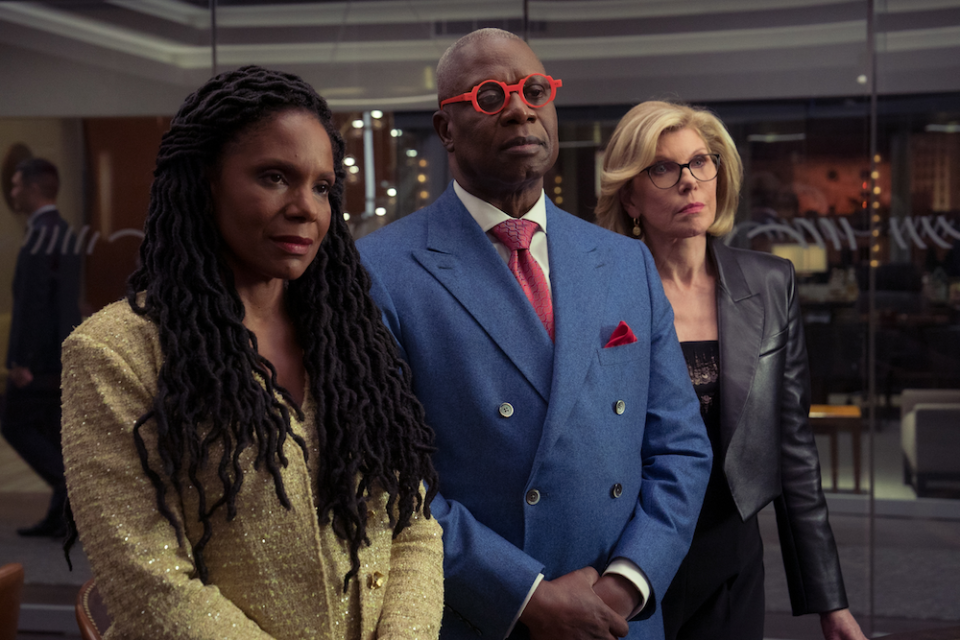
You brazenly set out to make a show that would live in the moment of our world, and since then you’ve had to navigate a vicious political climate, an insurrection and a pandemic. With so much uncertainty along the way, were you able to make the show you wanted?
Michelle: I can’t imagine a better show to be doing through it all. What was fortunate was that these characters were interested in politics, and were interested in the world around them. It didn’t feel like we were trying to impose on the characters the need to suddenly talk about what’s happening in Washington. No, those were the conversations these characters were naturally going to be having.
Robert: I think it would have been harder to be on a show that didn’t have any relevance, or was disconnected from what’s going on around it. We were always encouraged by CBS and then Paramount+ to follow our hearts on this stuff, and, for us, it always seemed more interesting to deal with what reality is now. As awful as it, it is pretty damn interesting. It’s not best for the world, but it was really exciting for the show to engage with some of these issues, as awful as that sounds.
But I am very happy with the last episode, because I think it honors what is happening right now, which is maybe even more prescient than it should be. To see what is going on with the militia groups coming out of the woodwork, like the stuff with Twitter, it kind of feels like there’s a breaking apart that I think the show tries to honor still within its fictional framework. I couldn’t be more thrilled for where the show ends up for that reason.
This interview has been edited and condensed.
Best of Variety
Sign up for Variety’s Newsletter. For the latest news, follow us on Facebook, Twitter, and Instagram.

